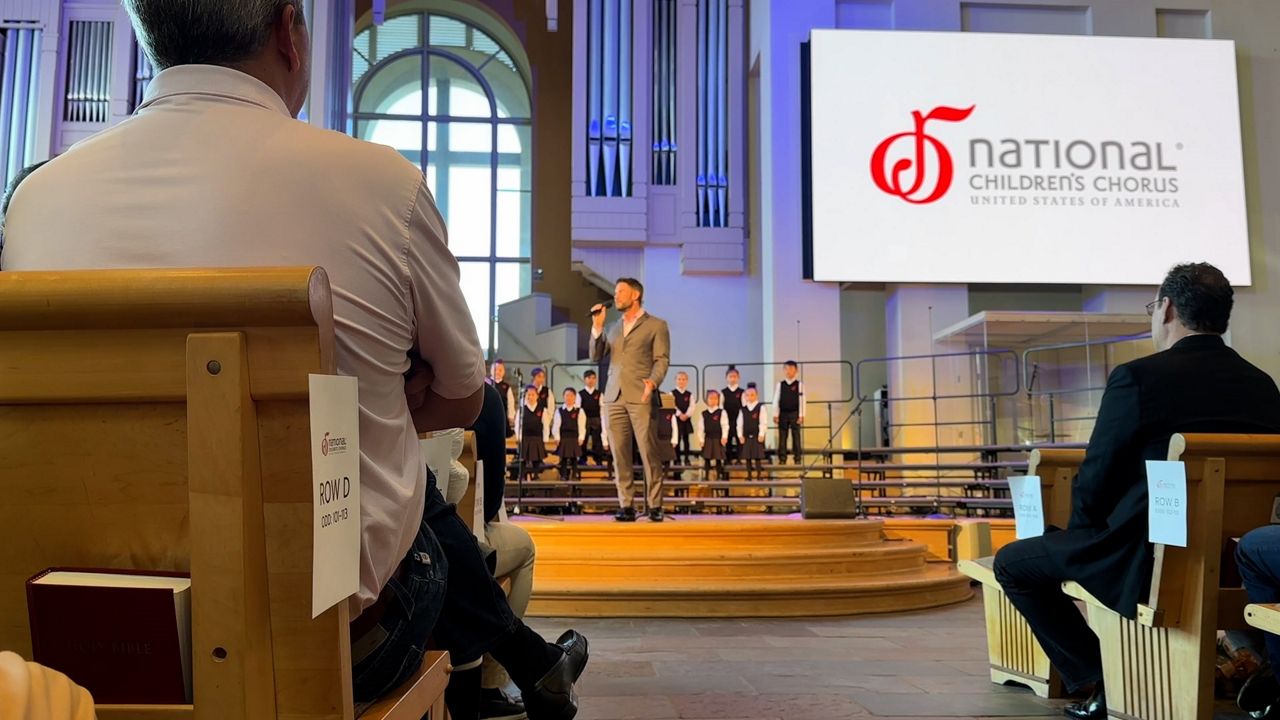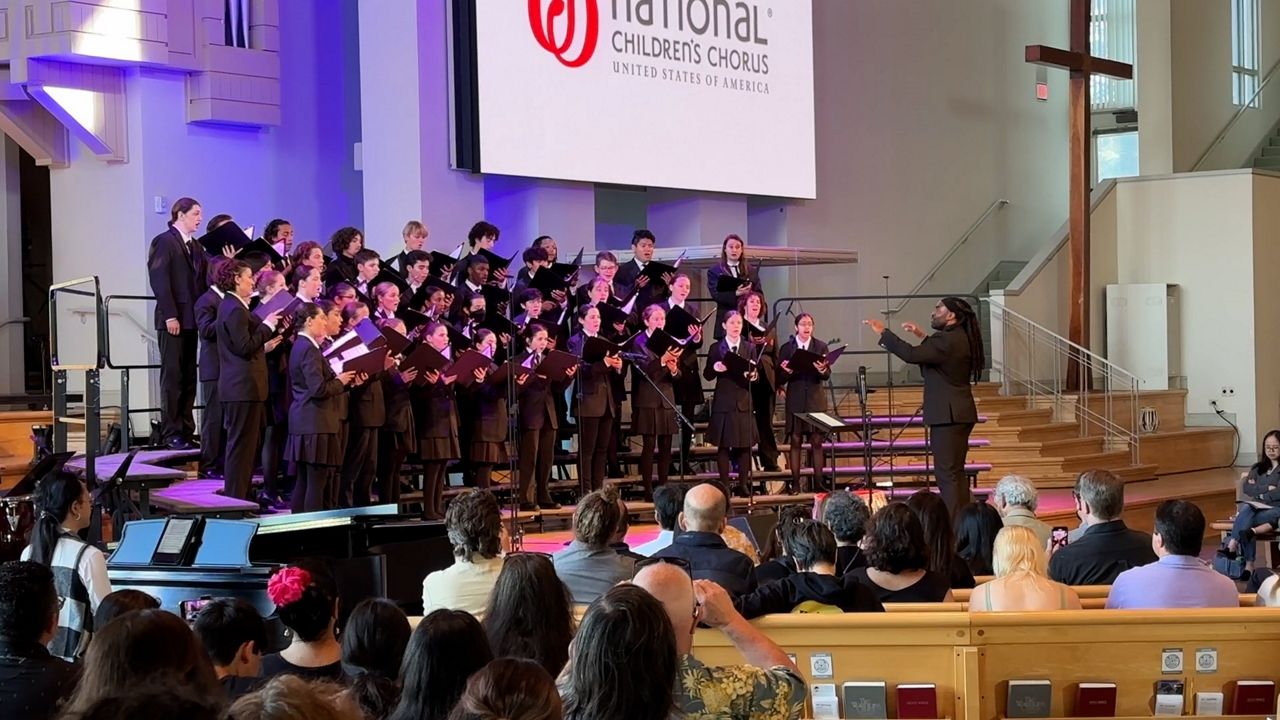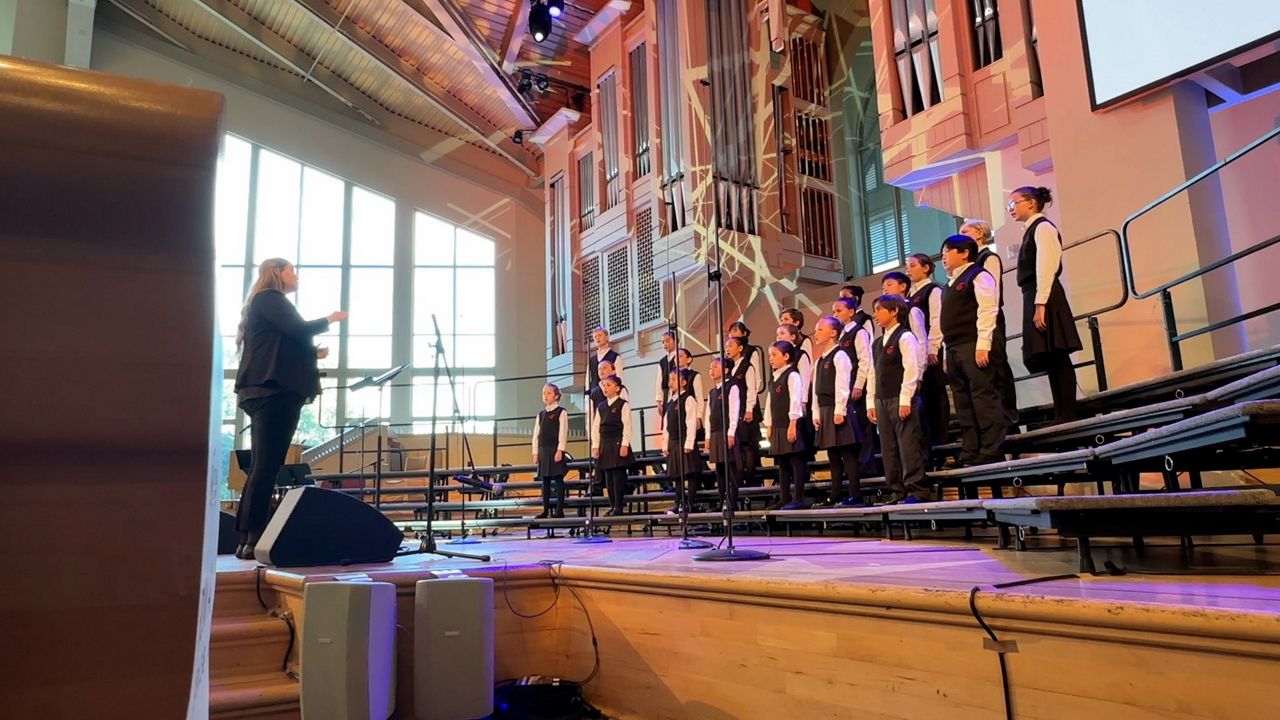LOS ANGELES — There is nothing like the power of music and singing in a chorus is that power multiplied by many. It’s a feeling Aurora Buckley Hymes recently experienced for the first time.
Sitting in the pews at Bel Air Church, she watched the singers in the younger levels perform while she waited her turn.
“It’s very cool here,” she said. “I really like how all the groups are coming together. It’s really a very cool experience.”
A few months ago, Aurora joined the National Children’s Chorus. She’s used to singing at home — making videos of her songs for her YouTube channel. The packed house at the church was very different.
“There were a lot of people, so that was definitely new,” she said, smiling.

Among the crowd, her parents Allison Buckley and Nick Hymes were beaming in the balcony. Aurora is a student in LAUSD where she has been designated as gifted in voice, which is how she ended up here.
This season, the NCC launched their first ever full scholarship program called Project Unison. Artistic director and CEO Luke McEndafer says the initiative, funded by private donors, is their biggest to date, covering all costs and fees — including materials, uniforms — even concert tickets.
“We know that there are a lot of communities with limited access to high quality musical training and with limited resources,” he said. “Some families don’t even have the capability of filling out financial aid applications.”
They decided to partner with LAUSD to identify students who are both in the key communities they are hoping to reach and who are skilled in music. Buckley says it was about two months ago when she received an email about it late one night and jumped at the opportunity for her daughter.
“That night I responded to it,” she said. “And by the next day, I had already heard back. It all happened super fast. And it’s been super fun for her.”

LAUSD Arts Specialist Christopher Rodriguez, who earned a Master’s of music in choral directing at the University of California in Santa Barbara, says this opportunity can change a child’s life.
“I know it’s a life-changing opportunity for some children, because choral music changed my life,” he explained. “Choral music creates — through this world of sound — a mix of culture, community beauty, strength, literacy, reading, music, color, professionalism. It also gives them this tremendous feeling of accomplishment.”
Project Unison is entirely donor funded and Rodriguez recently attended the NCC’s annual local fundraiser. He marveled at the level of musicianship the students had achieved and credited the program's “rigorous educational and artistic standards.”
The partnership makes sense, he says, because both the NCC and LAUSD are dedicated to bringing out “the excellence that lives in each child.”
“The leadership at the National Children’s Chorus shares are our drive to give children opportunities like this to achieve something different than they have may ever envisioned for themselves,” he said. “Project Unison is the vehicle that the kids will take on this journey, so that they can thrive now. They can thrive in college in a career, and you know, in life in general.”
It’s also fitting that Project Unison is being tested here in Los Angeles, where the National Children’s Chorus first began. Since then, it’s grown to now eight chapter cities and McEndafer hopes to eventually roll out the scholarship initiative nationwide.
Growing up in SoCal, he was part of his grade school chorus in La Cañada and sang in the UCLA chorale where he got his bachelor’s and master’s degrees and where NCC students like Aurora have their weekly rehearsal. The kids learn music, he says, but also much more.
“We’ve known for a long time that music is a medium through which we teach much bigger lessons about life,” he explained, “and those lessons can be from professionalism to being on time, building self confidence, and really discovering who [they] are…and what gifts they have to offer the world and our local communities.”
The effects of music education are far-reaching. Studies have tied it to increased language skills, brain development and hand eye coordination. Plus, there is a mental health benefit as well.
“Music is almost a meditation,” McEndafer said. “When you’re doing it, you really can’t think about other things. You have to be 100% focused. And so music really is something that we consider a human need, not just a hobby.”

Making equal access that much more important, he said. And right now, it’s far from equitable.
According to recent findings by The Arts Education Data Project, over 3.6 million students in the United States do not have access to music in their schools. A majority of those students, the findings show, attend public schools in urban areas and qualify for free or reduced meal programs.
Aurora’s parents are so grateful that she was singled out for this opportunity.
“I don’t think we would have, you know, had this experience,” Hymes, who is a musician himself, explained. “She wouldn’t been able to sing with the group. And it’s really going to give her an opportunity to have something new.”
New skills, new performance opportunities and a riser full of new friends that she is in synch with.



